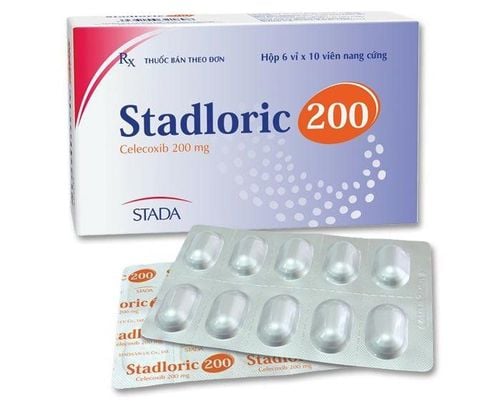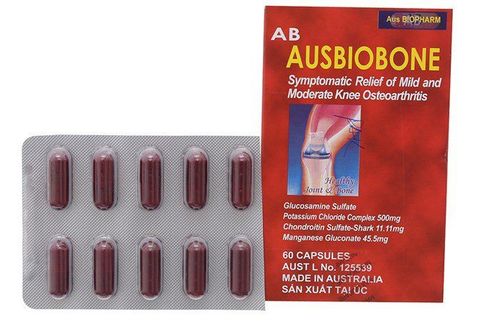This is an automatically translated article.
Rheumac has the active ingredient Celecoxib, which is a non-steroidal anti-inflammatory drug (NSAID) that selectively inhibits COX-2. The drug is effective in reducing signs and symptoms of chronic osteoarthritis, controlling acute pain in adults, including toothache, treating primary dysmenorrhea,...
1. What is Rheumac?
Rheumac has the active ingredient Celecoxib, which is a non-steroidal anti-inflammatory drug (NSAID) that selectively inhibits the enzyme COX-2 - an enzyme that responds to inflammatory agents. Therefore, the drug is effective in preventing the synthesis of Prostaglandin E2, the main cause of inflammation, pain, swelling and edema. Because Rheumac does not affect COX-1 enzyme, the physiological processes related to this enzyme in the gastric mucosa, intestine and platelets are not affected, so Rheumac does not cause many undesirable effects. desired as both COX-1 inhibitors.Rheumac is available in capsule form with each capsule containing 100mg of Celecoxib.
2. Indications of Rheumac
Indications to use Rheumac in the following cases:
Symptomatic treatment in adults with osteoarthritis. Symptomatic treatment in adults with rheumatoid arthritis. Adjuvant treatment to reduce the number of polyps in the conventional treatment of familial adenomatous polyposis. Treatment of acute pain (pain after surgery, pain after tooth extraction,...). Symptomatic treatment of primary dysmenorrhea. Rheumac is not contraindicated in the following cases:
Patients with a history of allergy or hypersensitivity to celecoxib or any of its ingredients. People with a history of allergy to sulfonamides. Patients with peptic ulcer disease are progressing or have stomach or intestinal bleeding. People with ischemic cardiomyopathy, peripheral vascular disease. Patients with congestive heart failure grade II - IV according to NYHA classification. Severe renal impairment (creatinine clearance < 30 ml/min). Severe liver failure. Patients with Crohn's disease, ulcerative colitis. Patients with a history of asthma, rash or other allergic-type reactions after taking aspirin or other non-steroidal anti-inflammatory drugs. Do not use Rheumac for pain relief during coronary artery bypass grafting.
3. Dosage and how to use Rheumac
3.1. How to use Rheumac Rheumac is produced in the form of capsules with a strength of 100mg Celecoxib each, for oral use. Before using the drug, the patient should carefully read the instructions for use on the drug leaflet. When swallowed, swallow the capsule whole with water.
Should be taken after meals so that the medicine does not irritate the stomach. In the case of patients taking high doses of Rheumac (800mg/day in 2 divided doses), Rheumac should be taken with food to improve absorption.
3.2. Dosage of the drug Rheumac Adults
Osteoarthritis subjects: 200mg/day, taken once or divided into 2 equal doses, taken after meals. Rheumatoid arthritis subjects: 200-400mg/day, divided into 2 times, after meals. Subjects with ankylosing spondylitis: 200mg/day, taken once or divided into 2 times, after meals. If treatment after 6 weeks does not improve symptoms, the dose can be increased to 400 mg/day. If there is no response after 6 weeks of taking 400mg/day, then change to another drug. Subjects with colorectal polyps: 800mg/day, divided into 2 times. Acute pain relief after surgery, tooth extraction: Take 400mg/time, the next dose is 200mg if there is still much pain, in the first day. In the following days, the dose continues to relieve pain for the patient, can take 400mg / day, divided into 2 times, after meals. Pain relief due to dysmenorrhea: Take 400mg/time, the next dose is 200mg if there is still a lot of pain, in the first day. In the following days, the dose continues to relieve pain for the patient, can take 400mg / day, divided into 2 times, after meals. Children
Dosage of Rheumac for children diagnosed with rheumatoid arthritis:
Children 2 years of age and older and weighing 10-25kg: Take a dose of 50mg/time, 2 times a day. Children 2 years and older and weighing over 25kg: Take 100mg/time, 2 times a day. Other population
Elderly (> 65 years old): No dose adjustment required. However, for the elderly with a body weight of less than 50 kg, the lowest recommended dose of Rheumac should be used at the start of treatment. Renal impairment: Rheumac should not be used in patients with creatinine clearance < 30ml/min. Hepatic impairment: For moderate hepatic impairment, the dose should be reduced by approximately 50% of the usual dose. Rheumac should not be used in patients with severe hepatic impairment.
4. Undesirable effects of the drug Rheumac
When using Rheumac, patients may experience some unwanted side effects as follows:
Common side effects are as follows:
Body and skin: Rash, peripheral edema. Digestive system: Abdominal pain, nausea, bloating, flatulence, dyspepsia, diarrhea. Respiratory system: Pharyngitis, rhinitis, sinusitis, upper respiratory tract infection, flu-like symptoms. Nervous system: Patients may feel dizzy, headache, fatigue, insomnia. Rare side effects are as follows:
Systemic and skin: Erythema multiforme, exfoliative dermatitis, Stevens-Johnson syndrome, anaphylactoid reactions, angioedema. Cardiovascular and vascular system: Causes congestive heart failure, ventricular fibrillation, pulmonary embolism, cerebral embolism, peripheral gangrene, thrombophlebitis, vasculitis. Digestive system: Intestinal obstruction, intestinal perforation, gastrointestinal bleeding, hemorrhagic colitis, esophageal perforation, pancreatitis, intestinal obstruction. Blood: Non-regenerative anemia, pancytopenia, leukopenia, agranulocytosis, decreased platelet count. Nervous system - Psychiatric: Ataxia, delusions of suicide. Renal-urinary system: acute renal failure, interstitial nephritis.
5. Be careful when using Rheumac
Patients using Rheumac should note the following information:
Use caution when using the drug in patients with a history of peptic ulcer, or a history of gastrointestinal bleeding. Use caution when using Rheumac in people with a history of asthma, or a history of allergy when taking aspirin or a non-steroidal anti-inflammatory drug because it can trigger an acute asthma attack or cause anaphylaxis. Long-term NSAID therapy in patients with direct renal damage, including renal papillary necrosis, increases the risk of nephrotoxicity in patients with underlying renal, hepatic, or cardiac impairment, or in geriatric patients. and in users who are taking diuretics , ACE inhibitors . Use caution when using Rheumac in subjects with edema, fluid retention (such as heart failure, kidney failure) because the drug has side effects causing fluid retention, peripheral edema, exacerbation of the disease. People with extracellular water loss (due to taking strong diuretics). Dehydration must be treated before taking Rheumac. Because there is no evidence that Rheumac reduces the risk of colorectal cancer associated with familial adenomatous polyposis, it is necessary to monitor the patient at regular intervals, possibly with a consultation. for laparoscopic, prophylactic colectomy when necessary. In addition, the risk of cardiovascular complications (myocardial infarction, myocardial ischemia) should be monitored in subjects receiving Rheumac. Rheumac does not have antiplatelet activity, so it does not protect the body from ischemic events, especially when taken at high doses for a long time (400-800 mg/day). Caution for pregnant women: To date, there are no adequate studies with Rheumac in pregnant women. Some experimental toxicity studies of Rheumac in rabbit fetuses at a dose of 150 mg/kg/day showed an increased incidence of fetal rib abnormalities and ventricular septal defects. Therefore, only use Rheumac for pregnant women when prescribed by a doctor with the potential benefits outweighing the possible risks to the fetus. In particular, Rheumac should not be used in the third trimester of pregnancy, because substances that inhibit prostaglandin synthesis may have an adverse effect on the fetal cardiovascular system. Note to lactating women: Rheumac was excreted in human milk in lactating rats, at concentrations similar to those in plasma. However, in humans, there is no evidence that Rheumac passes into breast milk. Because Rheumac can have serious side effects in breastfed infants, mothers need to weigh the benefits and risks when using drug therapy or stopping breastfeeding while taking Rheumac. Precautions while driving and operating machines: Patients who experience dizziness, lightheadedness or drowsiness while taking Rheumac should refrain from driving or operating machinery.
6. Overdose and Missed Dose of Rheumac
6.1. Overdosage of Rheumac and Management Overdose of nonsteroidal anti-inflammatory drugs may cause somnolence, nausea, vomiting, epigastric pain, and may also cause gastrointestinal bleeding. The rarer manifestations of Rheumac overdose are hypertension, acute renal failure, or respiratory depression and coma. Anaphylactoid reactions may also occur (rash, pruritus, hypotension, shock, etc.) when used with therapeutic doses of non-steroidal anti-inflammatory drugs, and an overdose reaction may occur. Treatment of Rheumac overdose consists of symptomatic and supportive treatment. There is currently no specific antidote for Rheumac. During the first 4 hours following a drug overdose, emetic therapy and/or activated charcoal (60 - 100 g for adults, or 1 - 2 g/kg for children) is used, and/or in combination with a Osmotic bleach may be effective for patients who already present with the disease. 6.2. Missing dose of Rheumac and what to do If the patient forgets to take a dose of Rheumac, take it again as soon as you remember. However, if it is too close to the next dose, skip the missed dose and take your next dose at the scheduled time. Do not take twice the prescribed dose at the same time. Rheumac belongs to the group of pain relievers, antipyretics, non-steroidal anti-inflammatory drugs or NSAIDs. The drug is indicated for use in cases of chronic osteoarthritis, management of acute pain in adults, including toothache, treatment of primary dysmenorrhea, etc. However, to ensure effective treatment. To treat and avoid the side effects of Rheumac, patients need to take prescription drugs under the advice of a specialist.













